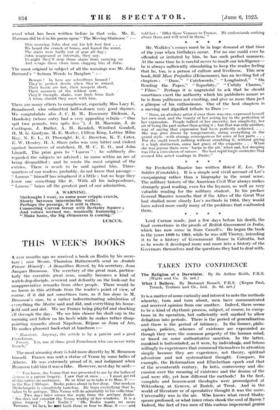Mr. Walkley's essays must be in huge demand at that
time of the year when birthdays occur. For no one could ever be offended or irritated by him, he has such perfect manners. At the same time he is careful never to insult our intelligence— he is always sufficiently stimulating to keep the reader feeling
that lie, too, is a person of culture and liveliness. This new book, Still More Prejudice (Heinemann), has an inviting list of chapters : " Duse," " Catchwords," " Longhaired," " On Reading the Paper," " Superbity," " Untidy Charms,"
" Films." Perhaps it is ungrateful to ask that he should sometimes exert the authority which his publishers assure us he is from politeness not exerting, and give us more than just a glimpse of his enthusiasms. One of the best chapters is a moving and dignified tribute to Duse :-
"Duse, an absolute artist if ever there was one, expressed herself her own soul, and the beauty of her acting lay in the perfection of her expression. People talked of her sincerity, her simplicity, her air of being the part rather than acting it ; btit that was Only another, way of saying that expression had been perfectly achieved.. . . She_ was gran donna by temperament, doing everything in the grand style—with strange consequences for some of her parts . . . Foi she could touch nothing without ennobling it, without giving it a high distinction, some last grace of the exquisite . . . When she was joyous there were harps in the air,' when sad, her weeping was like a convulsion of nature. She had rapid tragic moments that seemed like acted readings in Dante."














































 Previous page
Previous page